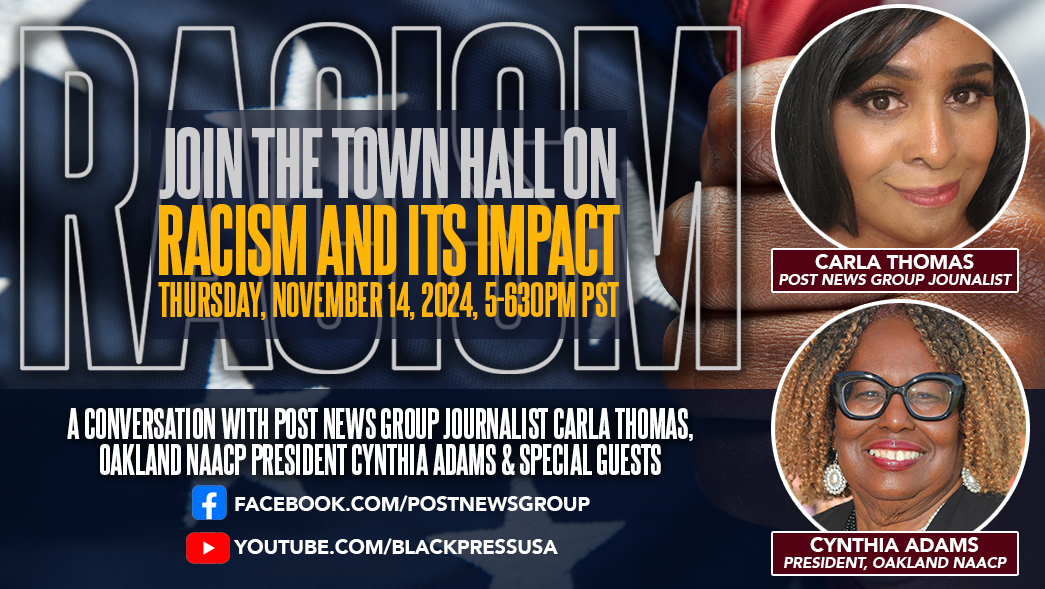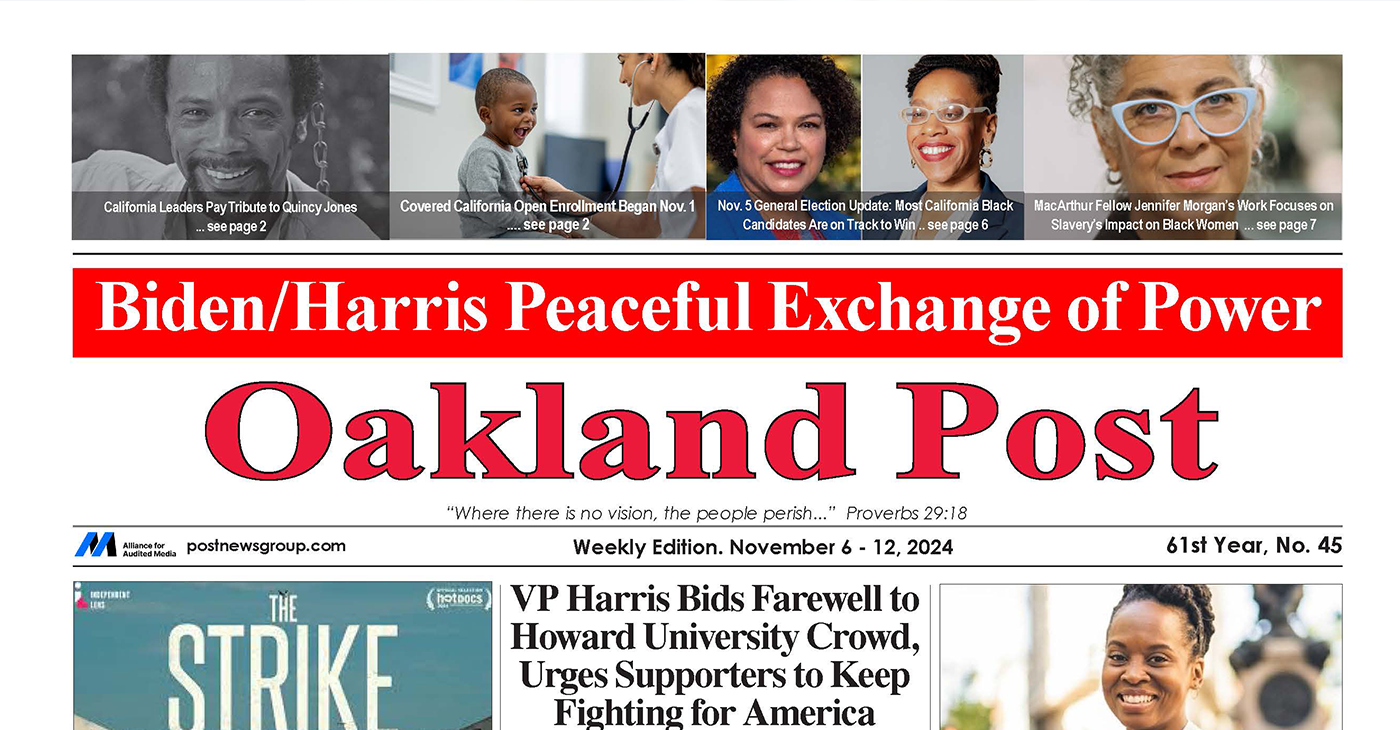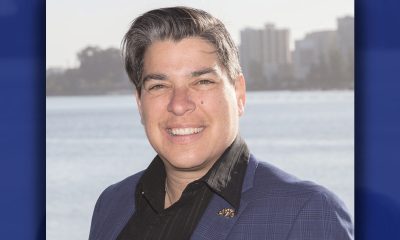Community
Promoting Wellness in the African American Community
In a historic move, Alameda County Behavioral Health Care Services (has funded the design phase of an African American Wellness Hub in Alameda County.
The organization’s steering committee is working to maximize recovery, resilience and wellness for African Americans who are experiencing mental health or substance use challenges.
<p>
“This investment will be some of the best spent money toward our effort in reducing mental health disparities and improving outcomes for the African American community,” said of Gigi Crowder, the organization’s Ethnic Services Manager.
“This is a new, trendsetting approach to providing supports and services that are culturally fine-tuned,” she said.
Wade Nobles, Ph.D., founding executive director of the Institute for the Advanced Study of Black Family Life and Culture, is the consultant for the project-planning phase, which will explore what the Wellness Hub would look like.
“This is not taking place anywhere in the country,” Dr. Nobles said “It is a special and radical shift where a county agency is going to have the voices of our community heard.”
A systematic response to those needs will be crafted.
“We want to preserve, understand and actualize the core best practices for African American people,” said Nobles. “There is a science of Black psychology that has been developed for 35 years, and we want to blend this with our understanding of African American culture and the healing practices to restore wellness to our community.”
The funding will be provided by the Mental Health Services Act (MHSA), based on a 1 percent tax on California residents with a personal income above $1 million.
The MHSA dollars are for a two-year project for the design phase of the African American Wellness Hub. The committee has recommended that hub be designed with spokes or satellite offices to meet the health needs of African Americans across the county.
The hub’s services would be offered in welcoming and nurturing environments. Staff would be hired who understand the cultural nuances and values embraced by African Americans.
More than 2 million adults – about 8 percent of the population – are affected by potentially disabling mental illnesses each year in California.
Due to the Mental Health Services Act, Alameda County programs have received funding to provide care and supports. Voters approved Proposition 63, the Mental Health Services Act, in 2004, and in 2005, it went into effect.
The African American Health and Wellness Steering Committee was established in February 2015 following up on the 2011 African American Utilization Study Report (http://www.aahi-sbc.org/uploads/African_American_Utilization_Report_-_Alameda_County_Behavioral_Health_Care_Services.pdf).
This report offered goals and recommendations to better address and respond to the African American community’s behavioral health needs.
At its annual Black History Month event Friday, Feb. 26, the African American Steering Committee will present Black Minds Matter 2! from 9 a.m. to 4 p.m. at the West Oakland Youth Center, 3233 Market St. in Oakland.
The morning is open to the public. Starting at noon, people are invited for lunch, and community input sessions will be held for African American community members to offer their insights about what is needed for the African American Wellness Hub.
For information, contact Gigi Crowder at (510) 777-2118 or GCrowder@acbhcs.org
Activism
LIVE! — TOWN HALL ON RACISM AND ITS IMPACT — THURS. 11.14.24 5PM PST
Join us for a LIVE Virtual Town Hall on the Impact of Racism hosted by Post News Group Journalist Carla Thomas and featuring Oakland, CA NAACP President Cynthia Adams & other Special Guests.
Thursday, November 14, 2024, 5 p.m. – 6:30 p.m. PST

Join us for a LIVE Virtual Town Hall on the Impact of Racism hosted by Post News Group Journalist Carla Thomas and featuring Oakland, CA NAACP President Cynthia Adams & other Special Guests.
Thursday, November 14, 2024
5 p.m. – 6:30 p.m. PST
Discussion Topics:
• Since the pandemic, what battles have the NAACP fought nationally, and how have they impacted us locally?
• What trends are you seeing concerning Racism? Is it more covert or overt?
• What are the top 5 issues resulting from racism in our communities?
• How do racial and other types of discrimination impact local communities?
• What are the most effective ways our community can combat racism and hate?
Your questions and comments will be shared LIVE with the moderators and viewers during the broadcast.
STREAMED LIVE!
FACEBOOK: facebook.com/PostNewsGroup
YOUTUBE: youtube.com/blackpressusatv
X: twitter.com/blackpressusa
Activism
Oakland Post: Week of November 6 – 12, 2024
The printed Weekly Edition of the Oakland Post: Week of November 6 – 12, 2024

To enlarge your view of this issue, use the slider, magnifying glass icon or full page icon in the lower right corner of the browser window. ![]()
#NNPA BlackPress
OP-ED: The Illusion of Allyship. White Women, Your Yard Signs Mean Nothing to Me
NNPA NEWSWIRE – “The blue bracelets are something White women are wearing so others can see that they didn’t vote for Trump,” says Liberal Lisa from Oklahoma on X. Chile, bye. These bracelets are hollow symbols, empty gestures that mean nothing to me. An accessory to claim distance from Trump’s legacy is superficial comfort, while the choice to not stand with us in the voting booth is far more profound.

Political yard signs can symbolize intentions and allegiance. But this year, they’ve also symbolized betrayal. During this general election, Black women were led to believe that more White women would stand with us. Exit polls, however, told a different story. Despite overwhelming displays of support, more White women still chose to vote for the convicted felon, reality TV star, and rapist. White women answered the call but left us hanging at the polls.
A Familiar Disappointment
I live in DeKalb County, Georgia, and the abundance of Harris-Walz yard signs could’ve fooled me. But I’ve seen this before, back when Stacey Abrams ran for governor. White women showed up, put up signs, attended rallies, knocked on doors, and phone-banked. Yet, when it came time to vote, they let us down—not once but twice. I’ve been here for over 15 years, and if there’s one thing I know, it’s that political signs are symbols without weight.
In every election, I’ve talked with White women. Most aren’t the primary earners in their families and vote along party lines, aligning with the preferences of their fathers and husbands. These conversations reveal a reluctance to break from tradition, even when their votes affect women and certainly when their votes impact the lives of people who look like me.
The Illusion of Solidarity—Symbols Are Not Enough
On social media, I’m seeing White women posting pictures of blue bracelets to “prove” they didn’t vote for Trump. “The blue bracelets are something White women are wearing so others can see that they didn’t vote for Trump,” says Liberal Lisa from Oklahoma on X. Chile, bye. These bracelets are hollow symbols, empty gestures that mean nothing to me. An accessory to claim distance from Trump’s legacy is superficial comfort, while the choice to not stand with us in the voting booth is far more profound.
I’ve seen Black Lives Matter signs and black squares posted on Instagram to “prove” support for Black people, but we now know that was a lie, too. Will those same people who claimed Black lives mattered now take down their Harris-Walz signs and show their true selves?
Navigating these truths is a daily struggle for me—professionally and socially. White women often misuse their privilege, supporting us only when it’s convenient. Seeing overqualified Black women sabotaged or abandoned by White women at critical moments is a constant emotional challenge. It’s exhausting to live with this reality, especially when solidarity seems like something they pick up and discard at will.
One clever campaign ad from Harris-Walz that spoke directly to White women. “Your Vote, Your Choice” emphasized that their vote was private—independent of their household situation. Another was from Olivia Howell Dreizen, the “Vote Without Fear” campaign, which empowered women to consider the greater impact of their choices. But it seems many still couldn’t choose the roadmap to freedom—even when it was handed to them.
A Call for Action Beyond Words
White women, I want to believe you care, but actions speak louder than yard signs, bracelets, or Instagram posts. Show up in our communities, advocate in your workplaces, and stand up to dismantle the structures that uphold white supremacy. Only through real action will we know where you stand.
If you choose not to act, we see you—and we know exactly where you stand. Good luck these next four years.
Disclaimer: The views and opinions expressed in this article do not necessarily reflect the official policy or position of BlackPressUSA.com or the National Newspaper Publishers Association.
-

 Alameda County3 weeks ago
Alameda County3 weeks agoAlameda County District Attorney Pamela Price Announces $7.5 Million Settlement Agreement with Walmart
-

 Activism2 weeks ago
Activism2 weeks ago‘Jim Crow Was and Remains Real in Alameda County (and) It Is What We Are Challenging and Trying to Fix Every Day,’ Says D.A. Pamela Price
-

 Activism4 weeks ago
Activism4 weeks agoOP-ED: Hydrogen’s Promise a Path to Cleaner Air and Jobs for Oakland
-

 Bay Area2 weeks ago
Bay Area2 weeks agoIn the City Attorney Race, Ryan Richardson Is Better for Oakland
-

 Bay Area4 weeks ago
Bay Area4 weeks ago2024 Local Elections: Q&A for Oakland Unified School Candidates, District 3
-

 Business3 weeks ago
Business3 weeks agoHarris Promises 1 Million Forgivable Loans for Black Businesses
-

 Activism2 weeks ago
Activism2 weeks agoOakland Post: Week of October 30 – November 5, 2024
-

 Business3 weeks ago
Business3 weeks agoStudy Confirms California’s $20/Hour Fast Food Wage Raises Pay Without Job Losses















































